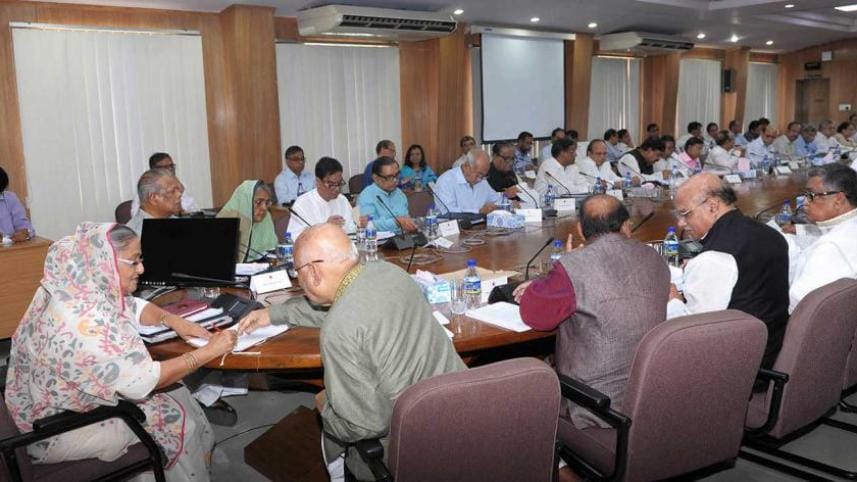Draft law approved to probe misconduct

The cabinet yesterday approved in principle a draft law specifying the procedures for investigation into allegations of misconduct or incapacity against a Supreme Court judge and the judge's removal by the Jatiya Sangsad.
On September 17, 2014, the JS unanimously passed the 16th Constitutional Amendment Bill through which it got back the powers to remove SC judges for misconduct or incapacity.
The move to enact the Supreme Court Judges (Investigation) Act-2016 came 19 months after the constitutional amendment.
Constitution experts have been stressing the need for enacting a law for appointment of SC judges first, rather than making a law for their removal.
Talking to reporters after the weekly cabinet meeting yesterday, Cabinet Secretary M Shafiul Alam said the draft law was placed before the cabinet, as it was a “constitutional obligation” under section 96(3) of the charter following the 16th amendment.
The approval comes around a week before the High Court is set to deliver a verdict on May 5 on a writ petition that challenged the legality of the 16th amendment empowering parliament to impeach an SC judge for incapacity or misconduct.
The chief justice has not given any opinion on the draft law sent to him recently.
The draft law says any aggrieved citizen with evidence would be able to file with the Speaker complaints of misconduct or incapacity against an SC judge.
The Speaker would then form a 10-member JS body to probe the allegations. And it would submit a primary report to the Speaker within a week.
If the report says the allegations against the judge concerned were true, the Speaker would form a high-powered committee with a former chief justice, an ex-attorney general and a noted jurist or an eminent citizen to review the report.
If the committee recommends removal of the judge concerned, the recommendation would be placed before the JS for discussion. And if adopted by two-thirds of the lawmakers, it would then be sent to the president for approval.
The cabinet secretary said if anyone brings false and baseless allegations of misconduct against any SC judge, the person would face two years of imprisonment or a fine of maximum Tk five lakh.
Such law is in practice in many countries, including the US, the UK, India and Australia, he said.
A similar law was there in the original constitution of 1972. But it was changed after 1975, and a provision was included in the charter for constituting Supreme Judicial Council. Such a council doesn't exist in any country except for Pakistan, he said.
The proposed law has a provision for “honourable exit” of an SC judge found guilty of misconduct, said Alam.
The cabinet would give its final decision on the draft law following discussions among all stakeholders on the matter, said the cabinet secretary.
Replying to a query, he said the proposed law doesn't contain anything which would curb the independence of the judiciary.
Law Minister Anisul Huq told BBC Bangla that this initiative [for enacting the law] would strengthen democracy as well as ensure accountability and transparency.
“Our aim is to ensure that no one can dishonour any judge,” he said.
Barrister M Amir-ul Islam, a member of the drafting committee of Bangladesh Constitution, 1972, said the government should have made a law first for appointing judges as per the constitutional provision of 95(2) [C]. The appointment of judges, not their removal, should be the first priority.
Judges should be appointed on the basis of qualification and track record so that there would be very little scope for their impeachment, he said.
“This should be our first priority. No government or parliament has ever addressed this. Now we are debating on the question of the removal of judges.
“In our experience, impeachment by parliament that we see sometimes becomes very politically motivated as happened in Malaysia, Singapore and Sri Lanka.”
The eminent jurist said no one would dispute that parliament is the decision-making body regarding the impeachment of judges.
He, however, said Malaysia and Sri Lanka saw political complications in impeaching judges. “So we should take their experience into consideration.”
Yesterday, the cabinet also approved the draft of the National Housing Policy 2016, and a proposal for establishing the Container Company of Bangladesh Ltd for running the railway's container transport services by an independent committee.
Besides, the cabinet adopted a resolution congratulating Prime Minister Sheikh Hasina for being selected as a member of the High-Level UN Panel on Water.



 For all latest news, follow The Daily Star's Google News channel.
For all latest news, follow The Daily Star's Google News channel.
Comments